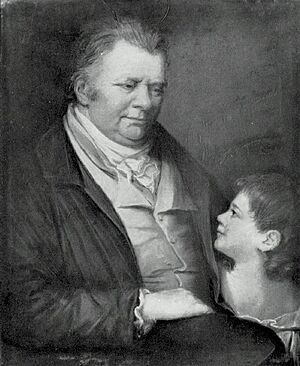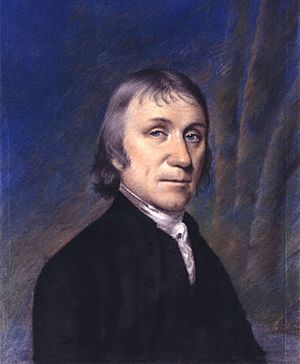James Keir facts for kids
Quick facts for kids
James Keir
|
|
|---|---|
| Born | September 20, 1735 |
| Died | 11 October 1820 (aged 85) West Bromwich
|
| Nationality | Scottish |
| Alma mater | Royal High School, Edinburgh University of Edinburgh |
| Awards | Fellow of the Royal Society of London |
| Scientific career | |
| Fields | chemist geologist industrialist inventor |
James Keir (born September 20, 1735 – died October 11, 1820) was a smart Scottish scientist. He was a chemist (someone who studies chemicals), a geologist (someone who studies rocks and Earth), an industrialist (someone who runs big factories), and an inventor. He was also a key member of the Lunar Society of Birmingham, a famous group of thinkers and scientists.
Contents
Early Life and Education
James Keir was born in Stirlingshire, Scotland, in 1735. He was one of many children in his family.
He went to the Royal High School in Edinburgh. Later, he studied medicine at the University of Edinburgh. There, he met Erasmus Darwin and they became lifelong friends.
Time in the Army
When he was 22, James Keir joined the army. He served in the West Indies during the Seven Years' War. Even in the army, he loved to study. He would wake up very early to read books about history and war. He even wrote a book about how to fight wars, but it was sadly lost in a fire.
In 1768, he left the army. He wanted to focus more on his scientific studies.
A Life of Science and Industry
James Keir eventually settled in West Bromwich, England. He spent his time studying chemistry and geology.
Glass and Chemical Discoveries
In 1772, Keir helped manage a glass factory near Stourbridge. While working there, he did many experiments with chemicals. He was especially interested in how alkalis (a type of chemical) behaved. He even wrote a paper about how glass forms crystals, which was shared with the important Royal Society.
He also translated a big French dictionary of chemistry into English. In 1777, he wrote his own book about different kinds of gases.
Working with Famous Inventors
Keir became good friends with Matthew Boulton, a famous manufacturer. Through Boulton, he met James Watt, who invented the improved steam engine.
In 1778, Keir took charge of Boulton and Watt's engineering factory in Birmingham for a while. He helped them with their business.
New Inventions and Factories
In 1779, James Keir invented a new metal alloy. This alloy was a mix of copper, zinc, and iron. It was special because it could be shaped when it was hot or cold. This invention was very similar to a metal later called Muntz metal.
In 1780, Keir started a chemical factory with his friend Alexander Blair. They made alkali, a chemical used in many industries. They also added a soap factory. A road near their factory is still called Factory Road today!
Working with Joseph Priestley
When Joseph Priestley, another famous scientist, moved to Birmingham in 1780, Keir helped him a lot. Keir had found out the difference between carbon dioxide gas and regular air. He worked closely with Priestley to learn more about gases.
Keir shared his discoveries with the Royal Society. He wrote about how metals dissolve in acids. This work might have even helped lead to the invention of electro-plating, a way to coat metals.
Geology and Coal Mining
Around 1794, Keir and Blair bought land to start a coal mine called Tividale colliery. Keir also studied the rocks and minerals of Staffordshire. He wrote an article about it for a history book.
Other Writings and Interests
James Keir also enjoyed writing. In 1791, he wrote a biography about his friend, the writer Thomas Day.
He also wrote pamphlets to share his opinions. For example, he wrote about why France might still be a threat to Britain. He even wrote poetry and helped his friend Erasmus Darwin with his famous poem, "The Botanic Garden."
Honors and Legacy
- James Keir was chosen as a Fellow of the Royal Society of London in 1785. This is a very high honor for scientists.
- He is remembered as part of the Lunar Society Moonstones in Birmingham, which celebrates the famous members of the Lunar Society.
James Keir died in West Bromwich in 1820. He was buried at All Saints Church. He was a true polymath, meaning he was skilled in many different areas of knowledge, from chemistry to geology to business and writing.
 | James Van Der Zee |
 | Alma Thomas |
 | Ellis Wilson |
 | Margaret Taylor-Burroughs |



